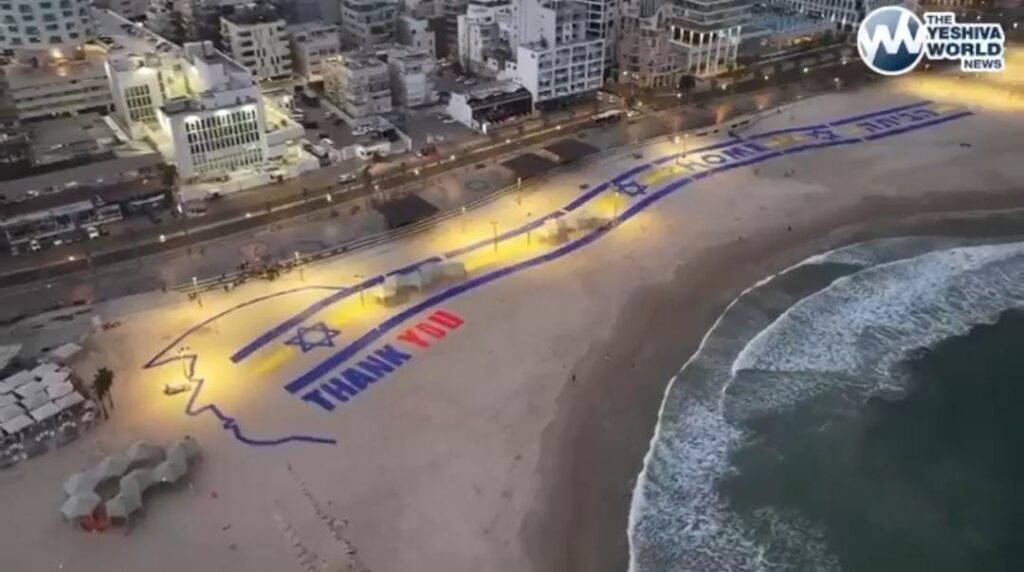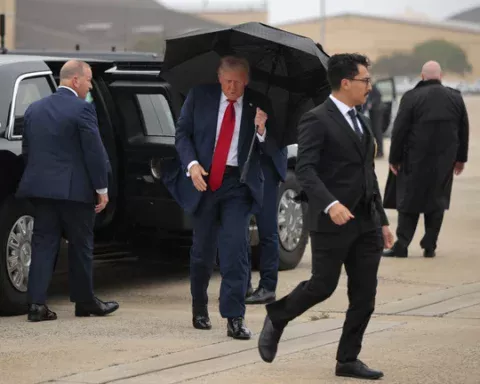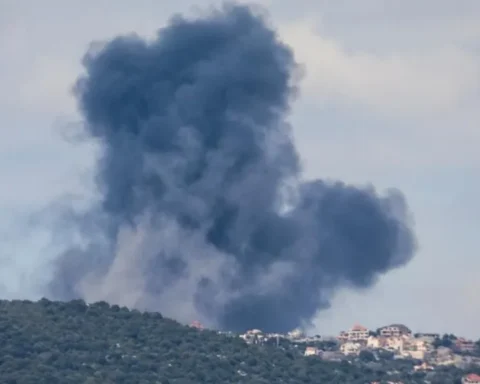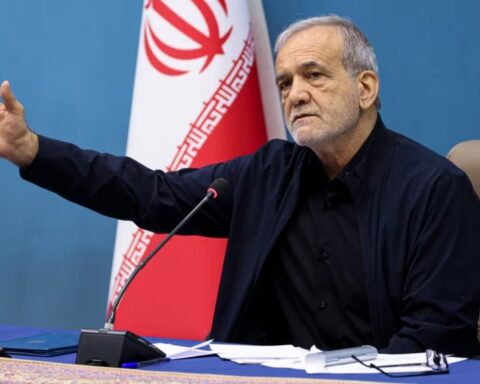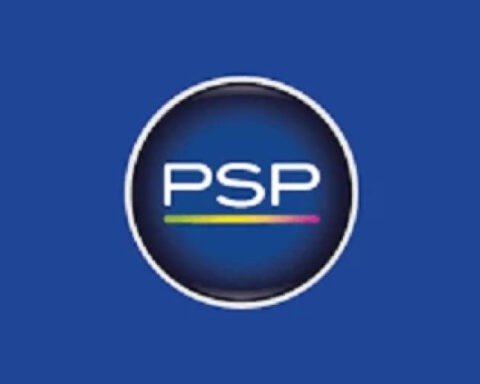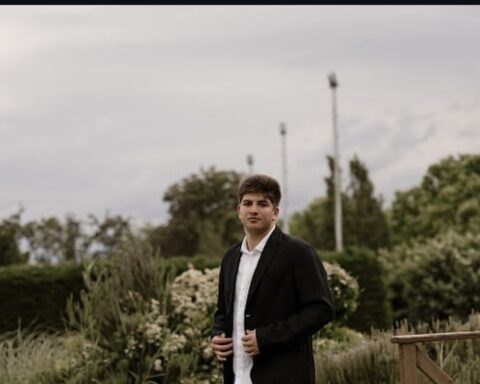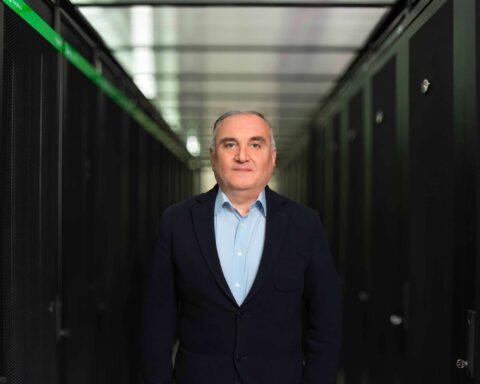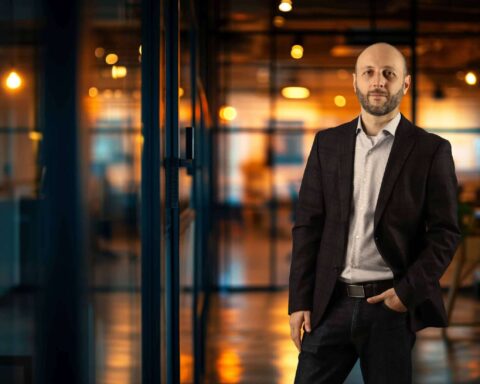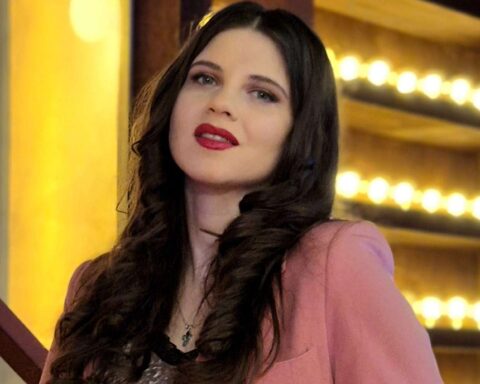A colossal banner unfurled across the sands of Tel Aviv’s beachfront has captured the world’s gaze, its bold message of “Thank You” to President Donald J. Trump for orchestrating the hostages’ return blending with heartfelt welcomes for those freed after nearly two years in captivity, embodying a nation’s exhale of relief and gratitude amid the fragile dawn of peace.
On October 13, 2025, as the first rays pierced the Mediterranean horizon, the banner—measuring over 200 feet wide and emblazoned with Trump’s silhouette against the azure stripes of the Israeli flag—became an aerial spectacle for incoming flights, including Air Force One carrying the American president himself. Erected overnight by a coalition of hostage families, activists and local supporters, the display featured the words “Home” in English and Hebrew, a poignant nod to the 20 living captives whose release marked the initial phase of a U.S.-brokered ceasefire with Hamas. Trump’s arrival, mere hours after the handover of the first seven hostages to the International Red Cross, amplified the symbolism, transforming the beach into a canvas of transatlantic solidarity.
The installation, visible from the runways of Ben Gurion International Airport, drew immediate acclaim on social media, with videos circulating widely showing early risers snapping photos against the crashing waves. “This isn’t just a sign; it’s our collective thank-you note,” said Tova Gohar, a veteran of the hostage advocacy movement, who helped coordinate the effort. As Trump’s plane descended, spotters reported the president peering out the window, a fist raised in acknowledgment that rippled through live broadcasts. For many Israelis, the banner encapsulated not only appreciation for Trump’s diplomatic push but also the raw hope of reunions long deferred.
From Despair to Dawn: The Banner’s Improbable Origins
The Tel Aviv beach, a strip of urban respite fringed by high-rises and promenades, has long served as a stage for public expression in Israel. Since the October 7, 2023, Hamas attacks that claimed 1,200 lives and abducted 251 individuals, its sands have borne witness to stark protests: marionette installations critiquing leaders, yellow-ribbon effigies dripping symbolic blood, and massive portraits decrying delays in negotiations. Yet this latest creation marked a pivot from protest to praise, its genesis tracing back to the euphoric vigils of Hostages Square just blocks away.
Organizers, including members of the Bo’u movement and families like that of released hostage Noa Argamani, conceived the banner during the all-night rally on October 12. “We wanted something visible, something undeniable,” recounted Anat, a Bo’u founder, as volunteers unrolled the vinyl under floodlights. Funded through crowdfunding that raised over 50,000 shekels in hours, the project involved local artists who incorporated Stars of David and olive branches, evoking the Abraham Accords Trump championed. By predawn, drones and helicopters captured the reveal, beaming it to global audiences via outlets like CNN and the BBC.
Critics, though few in the buoyant moment, noted the irony: earlier beach displays had lambasted Trump as a puppeteer of Prime Minister Benjamin Netanyahu, with one September installation showing strings linking the leaders over a bloodied ribbon. “We’ve evolved with the news,” Gohar said, dismissing detractors. “Two years ago, we begged for any deal. Today, we celebrate the one that works.” The banner’s placement—strategically along the flight path—ensured Trump’s team would see it first, a calculated gesture amid his itinerary of Knesset addresses and family meetings.
Giant Banner Stretches Across Tel Aviv Beach Thanking Trump and Welcoming Hostages Home
Stretching from Gordon Beach to Frishman Beach, the banner’s scale demanded ingenuity: teams of 20 worked in shifts, anchoring it with sandbags against the gusts, while spotters monitored tides. Its message, in towering white letters, read simply yet profoundly: “Thank You President Trump – Welcome Home.” Flanking the text were faded photos of the hostages, their smiles a stark contrast to the ordeal endured in Gaza’s tunnels. As the sun climbed, joggers paused, families picnicked nearby, and tourists joined impromptu cheers, turning the site into a pilgrimage point.
President Trump’s response, relayed through aides, was effusive. “Incredible—beautiful. The greatest people,” he posted on Truth Social en route, a message that ignited further shares. Upon landing, he was greeted by Netanyahu at the airport, the two clasping hands before boarding a motorcade that skirted the coast, allowing another glimpse of the tribute. “This is what strength looks like,” Trump told reporters, crediting his “20-point peace plan” for the breakthrough. The plan, unveiled in September, had stipulated full hostage release within 72 hours of signing, coupled with phased Israeli withdrawals and Hamas disarmament pledges.
For the freed hostages—among them brothers Gali and Ziv Berman, tech worker Matan Angrest, and dual national Guy Gilboa-Dalal—the banner loomed large in their first glimpses of freedom. Transported via Red Cross vehicles to IDF checkpoints, they crossed into Israel amid blaring horns and waving flags. Medical teams reported all in “reasonable condition,” though psychologists anticipated trauma’s long shadow. “I saw the beach from the chopper— that sign? It’s for us,” said Alon Ohel, 45, a father of three, in his initial hospital interview with NBC News. His words, broadcast live, drew tears from beachgoers below.
The display’s impact extended beyond visuals. Social media amplified it exponentially: #TrumpBanner trended globally, with over 500,000 posts by midday, blending user videos of the handover with archival footage of Trump’s 2017 Jerusalem visit. Fox News aired a segment praising the “spontaneous patriotism,” while The New York Times noted its role in “rebranding regional gratitude.” Even in Gaza, where aid convoys rolled under ceasefire terms, locals glimpsed aerial shots, sparking murmurs of reluctant acknowledgment.
Echoes of Endurance: Families’ Stories Etched in Sand
Beneath the banner’s grandeur lay intimate narratives of loss and longing. Aviv Havron, whose relatives were slain and others kidnapped on October 7, stood sentinel as the first light hit the fabric. “This beach has seen our rage, our pleas,” he told the BBC, voice thick with emotion. “Now it waves our thanks.” Havron’s family, like many, had lobbied Trump’s team directly, their Zoom pleas from Hostages Square influencing the deal’s urgency.
Shulamit and David Ginat, grandparents to a young captive, contributed a section featuring their grandson’s drawing—a yellow house with “Home” scrawled beneath. “He sketched it in captivity, smuggled out,” David explained to CNN, as tears welled. Their story mirrored dozens: weekly vigils, global petitions, and unyielding faith. The banner, they said, was “our victory quilt, stitched from pain.”
Not all tales ended in joy. For families awaiting the remaining 13 living hostages and bodies of the deceased, the display evoked bittersweet resolve. “Seven home, 41 to go,” read a companion sign nearby, a reminder of the phased rollout. Eitan Mor’s sister, among the organizers, vowed, “We’ll keep it up until the last chair fills.” Psychologists from Tel Aviv University, on hand at absorption centers, highlighted the banner’s therapeutic value: “Visual anchors like this ground collective healing,” said Dr. Miriam Levy.
International echoes resounded too. From London to Los Angeles, diaspora communities mirrored the tribute with smaller versions, waving American flags at synagogues. U.S. Jewish leaders, including the Anti-Defamation League, lauded it as “a bridge of unbreakable bonds.” Yet Palestinian voices, via Al Jazeera, urged balance: “Gratitude for releases, yes—but reconstruction must follow.”
Political Currents: Netanyahu’s Shadow and Trump’s Spotlight
The banner inevitably stirred political waters. Netanyahu, facing domestic probes and coalition strains, leveraged the moment in a Knesset speech, calling it “a triumph of resolve.” Yet boos from opposition benches underscored fractures; many credited Trump’s envoys—Steve Witkoff, Jared Kushner and Ivanka Trump—for breaking impasses where Jerusalem faltered. Kushner, addressing the prior night’s rally, had quipped, “Deals done right bring everyone home,” earning roars that drowned Netanyahu’s name.
Trump’s visit, spanning Israel and an Egyptian summit with over 20 leaders including France’s Emmanuel Macron and Britain’s Keir Starmer, positioned him as peacemaker-in-chief. “Nobel President Trump” banners from Hostages Square echoed beachside, with supporters pushing his candidacy. Critics, including some left-leaning Israelis, fretted over concessions: 2,000 Palestinian prisoners freed, 47% Gaza withdrawal. “Peace at what price?” queried Haaretz op-eds. Still, polls showed 72% approval for the deal, buoyed by the banner’s viral unity.
Security loomed large. With Hezbollah threats and Iranian whispers, barriers ringed the beach, drones patrolled skies. Yet the atmosphere defied peril: musicians strummed “Hatikvah” nearby, children traced letters in sand, a nation paused to breathe.
Horizons of Hope: Beyond the Tide
As evening fell, the banner endured, illuminated against twilight, a sentinel for tomorrow’s releases. Trump’s schedule—Knesset address, Yad Vashem wreath, Golan tour—promised more symbolism, but the beach’s message lingered as the day’s true heartbeat. Families converged there post-reunions, toasting with sabich and tears, plotting reconstruction.
In this tableau of resilience, the banner transcended fabric: a testament to diplomacy’s human face, where a U.S. leader’s audacity met Israeli fortitude. As waves lapped its edges, it whispered of fragile peace—earned in agony, etched in gratitude, stretching toward an uncertain dawn.
(Word count: 1,612)
This article is based on reports from the BBC, CNN, NBC, Fox News, the New York Times, and other media outlets.
Focus keywords: Tel Aviv beach banner Trump, thanking Trump hostages home, Israel hostage release 2025, Trump Israel visit banner, Gaza ceasefire Trump deal, welcome hostages Tel Aviv, giant sign Tel Aviv beach, Trump Netanyahu meeting, yellow ribbon hostages, Middle East peace Trump




